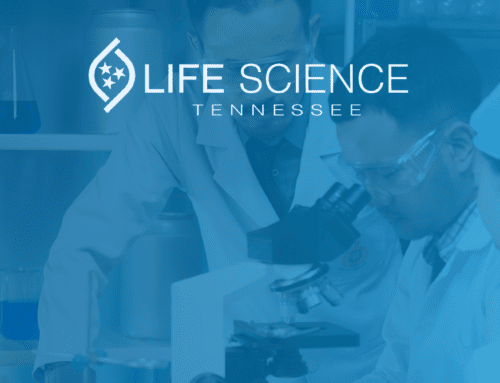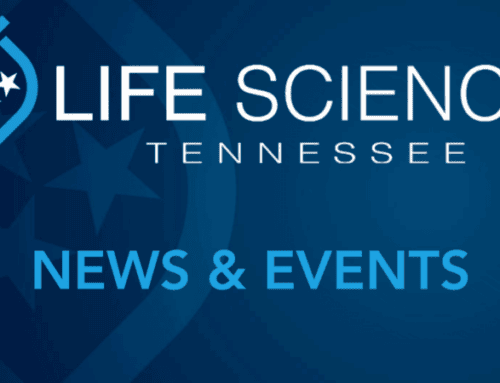Life Science Tennessee’s strength is our members: Experts with diverse knowledge in everything from biomedical research to medical devices and therapies to innovative agriculture practices.
At a time when the world’s attention is turned toward the life sciences as the driving force behind a cure, we wanted to give our experts the chance to talk about their work and the myriad contributions of the life science industry to the health and well-being of people around the world. Today, we’re launching a new series called “Through the Lens” where each month we feature a different LST member offering his or her expertise.
The COVID-19 pandemic has shown the importance of continued funding for drug development and discovery—and the long road to these cures. For the first entry in this series, Ted Townsend—LST board chairman and chief economic development and government relations officer for the University of Memphis—writes about the university research underway related to SARS-CoV-2 and the value of collaboration.
**
With the advent of the SARS-CoV-2 (COVID-19) global pandemic, the hopes of the entire world rest on the development of innovations and technologies that will deliver novel diagnostic tests, therapeutic treatments and preventative vaccines—supported by a robust, global biologistics supply chain. There is but one industry that can meet the challenge to combat and eradicate the threat of this virus: The life sciences.
So much is already underway to understand the complex mechanisms of the virus and its biological manifestations. But the fuel of this rapid comprehension is generated through the highly sophisticated apparatus of academic and private sector research.
The reliance on effective data and discovery will ultimately influence how we respond and recover in every facet of our daily lives. Health care protocols, technology utilization, socio-economic policy, education and workforce environs will all be impacted by what the basic and applied research tells us.
The rapid response and urgency of an expectant world audience further complicates the demands on the research. But we trust the scientific process and firmly believe that solutions will be discovered.
Here in Tennessee we have witnessed a swift statewide mobilization of subject matter experts from all disciplines and modalities within the medical and higher education research community. It is reflective of our heritage as the Volunteer State to see the efforts underway on a massive scale.
Starting with the institution that I have the honor of representing, the University of Memphis has responded on multiple levels from community food shortages, to additive manufacturing of face shield components, to allowing for the rapid commercialization of COVID-19 related research by lowering technology transfer barriers.
The YMCA of Greater Memphis and the Mid-South and University of Memphis in partnership with Chartwells has provided 173,000 meals for Shelby County students—delivering as many as 10,000 meals each day since March 25.
Dr. Linda Jarmulowicz, dean of the University of Memphis’ School of Communication Sciences and Disorders, recently led efforts to assist local hospitals treating ventilated patients impacted by the coronavirus by providing low-tech communication boards. The boards feature many types of messages, used by pointing toward pictures or letters to spell out words in English or Spanish, and will assist medical personnel communicating with patients and patients with their family members.
The University of Memphis joined more than 50 institutions worldwide when it endorsed and committed to the COVID-19 Licensing Guidelines recently released by the Association of University Technology Managers (AUTM). The new principles provide global guidance for tech transfer offices, focusing on research intended to develop technologies, treatments and solutions needed during the current pandemic.
To meet the scale of the pandemic’s threat, we will need all measures of partnerships and collaborations. We have already seen this statewide.
On May 15, the University of Tennessee Health Science Center (UTHSC) Office of Research, in collaboration with the University of Memphis, announced a new CORNET RFA focused on SARS-CoV-2/COVID-19 Research. This RFA will cover the full translational science spectrum of T0 – T4 where up to five CORNETs will be awarded.
The University of Tennessee Health Science Center’s Regional Biocontainment Lab—led by Dr. Colleen Jonsson—is one of 12 federally funded labs in the country designed to safely study dangerous pathogens. Dr. Jonsson and her team have been working with the Summit supercomputer at Oak Ridge National Lab to develop and test novel antiviral compounds to aid in the fight against COVID-19.
In addition, the Crowe Lab at Vanderbilt University Medical Center (VUMC) is working to identify antibody therapies and develop a vaccine, while other researchers in the Denison Lab work on an antiviral drug to treat patients with COVID-19 symptoms.
These are just a few examples of the scale of response and collaboration from universities in Tennessee. These collective efforts will not only drive us to find a cure for SARS-CoV-2 but will also accelerate new biotech innovations with the potential to fight other diseases that impact millions every day.




